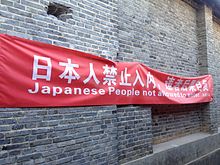
Back معاداة اليابانيين في الصين Arabic Sentimientu antixaponés en China AST Sentimiento antijaponés en China Spanish Sentiment antijaponais en Chine French Sentimen anti-Jepang di Tiongkok ID 중국의 반일 정서 Korean Tâm lý bài Nhật ở Trung Quốc Vietnamese 中国反日情绪 Chinese

Anti-Japanese sentiment in China is an issue with modern roots (post-1868). Modern anti-Japanese sentiment in China is often rooted in nationalist or historical conflict, for example the atrocities and war crimes committed by Imperial Japan in the First Sino-Japanese War, Boxer Rebellion (Eight-Nation Alliance), Siege of Tsingtao, Second Sino-Japanese War and Japan's history textbook controversies.
Bitterness in China persists over the Second Sino-Japanese War and Japan's post-war actions. This sentiment may also be at least to some extent influenced by issues related to Chinese people in Japan.
According to a 2017 BBC World Service Poll, mainland Chinese people hold the largest anti-Japanese sentiment in the world, with 75% of Chinese people viewing Japan's influence negatively, and 22% expressing a positive view. Anti-Japanese sentiment in China was at its highest in 2014 since the poll was first conducted in 2006 and was up 16 percent over the previous year.[citation needed] However, anti-Japanese sentiment significantly decreased by 2018; a poll done in 2018 by Genron NPO showed that 42.2% of Chinese people looked positively to Japan, up from 31.5% in 2017.[1]
- ^ "Poll Shows Over 40% of Chinese Have a Favorable View of Japan". nippon.com. 2018-11-08. Retrieved 2020-01-31.
© MMXXIII Rich X Search. We shall prevail. All rights reserved. Rich X Search